Watches of Switzerland: Global Business Environment Analysis Report
VerifiedAdded on 2023/06/17
|5
|644
|109
Report
AI Summary
This report provides an analysis of the global business environment impacting Watches of Switzerland, a leading watch brand in the UK. It highlights key issues such as inflation, global economic growth, and supply and demand, and uses the PESTLE framework to evaluate macro environmental factors. The analysis covers political, economic, social, technological, environmental, and legal factors, assessing their impact on the company. Technological advancements and elasticity of demand are identified as significant changes in the luxury watch market. The report concludes that technology has a positive impact, while economic and social factors present critical challenges to the firm's operations and effectiveness. The report references academic sources to support its analysis.
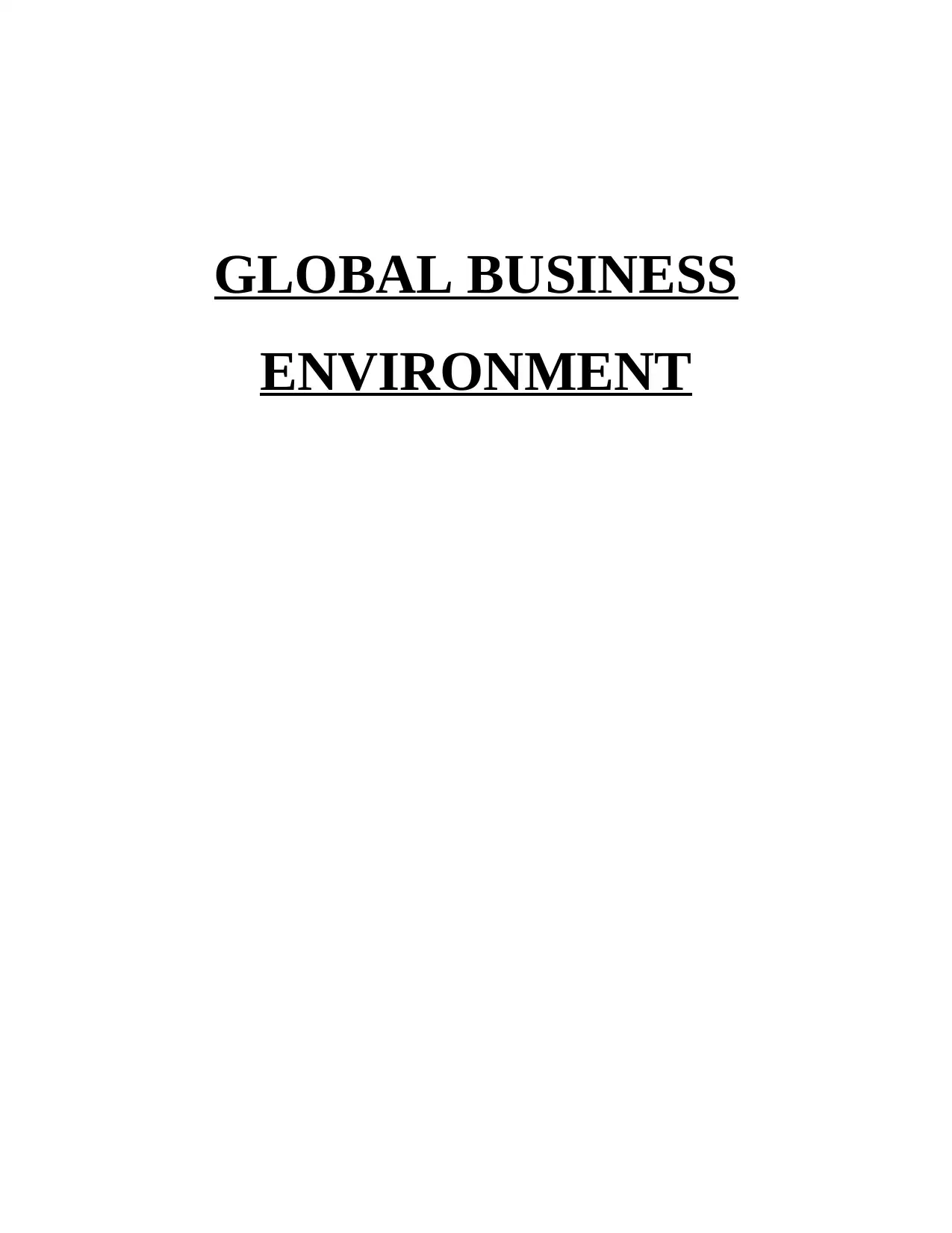
GLOBAL BUSINESS
ENVIRONMENT
ENVIRONMENT
Paraphrase This Document
Need a fresh take? Get an instant paraphrase of this document with our AI Paraphraser
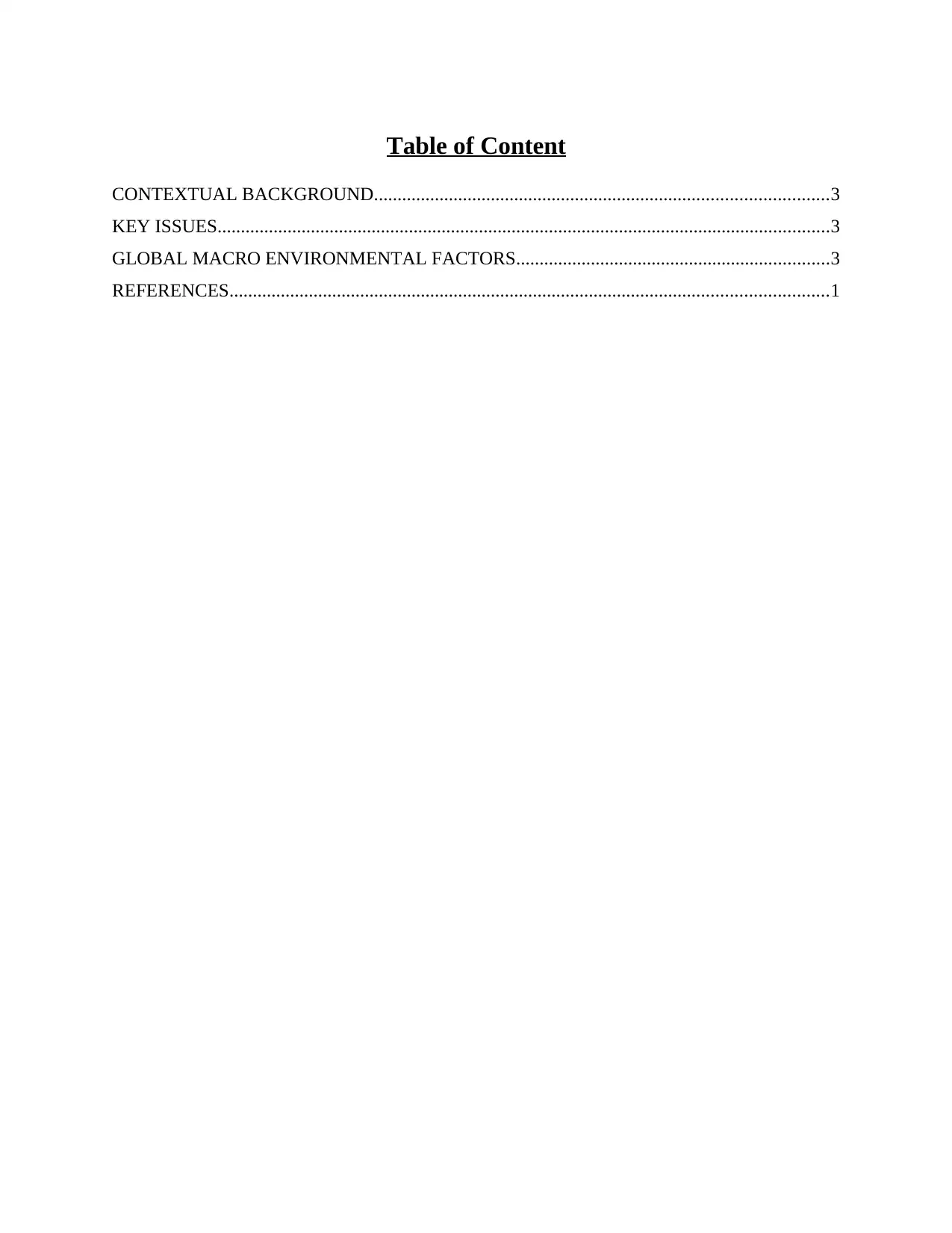
Table of Content
CONTEXTUAL BACKGROUND.................................................................................................3
KEY ISSUES...................................................................................................................................3
GLOBAL MACRO ENVIRONMENTAL FACTORS...................................................................3
REFERENCES................................................................................................................................1
CONTEXTUAL BACKGROUND.................................................................................................3
KEY ISSUES...................................................................................................................................3
GLOBAL MACRO ENVIRONMENTAL FACTORS...................................................................3
REFERENCES................................................................................................................................1
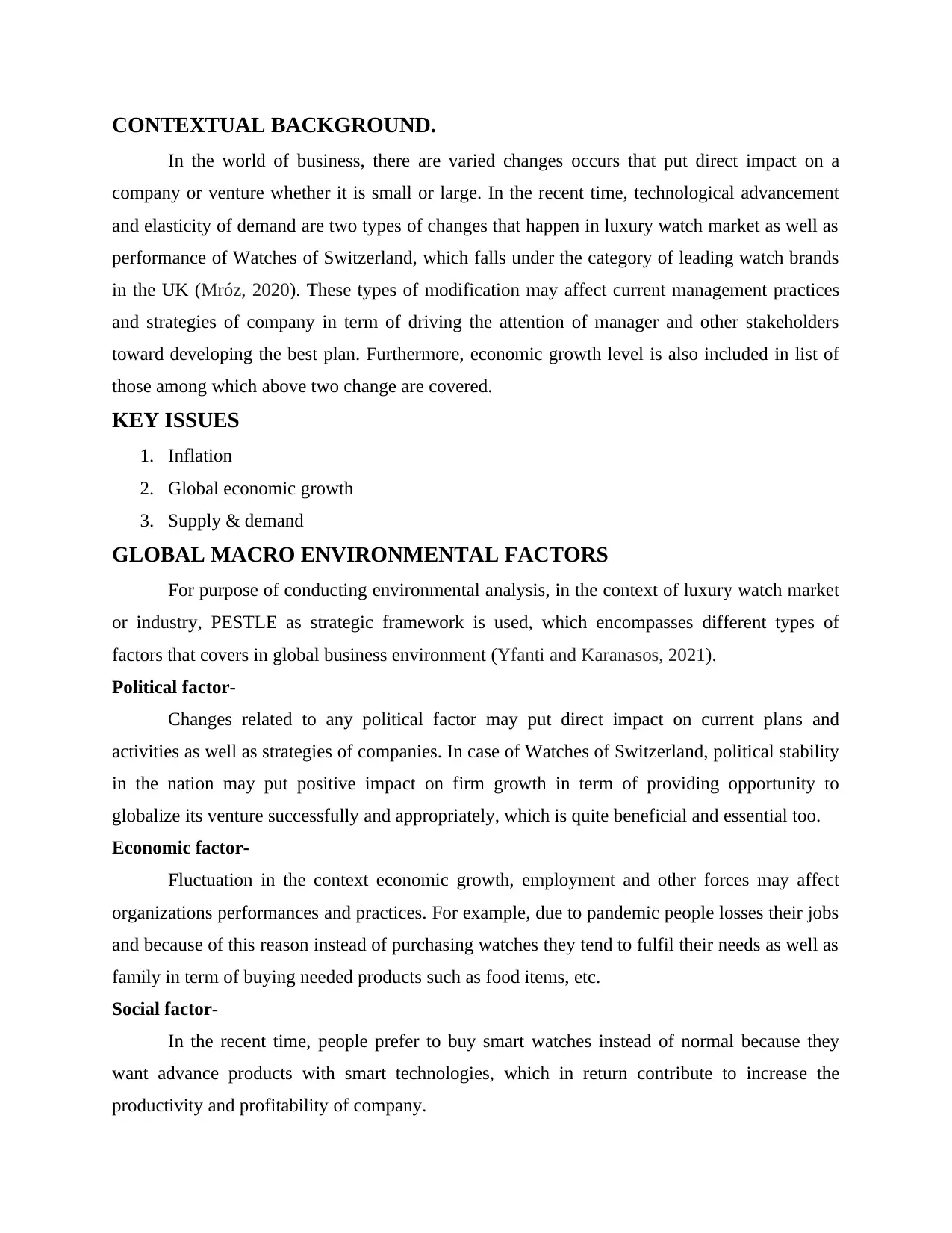
CONTEXTUAL BACKGROUND.
In the world of business, there are varied changes occurs that put direct impact on a
company or venture whether it is small or large. In the recent time, technological advancement
and elasticity of demand are two types of changes that happen in luxury watch market as well as
performance of Watches of Switzerland, which falls under the category of leading watch brands
in the UK (Mróz, 2020). These types of modification may affect current management practices
and strategies of company in term of driving the attention of manager and other stakeholders
toward developing the best plan. Furthermore, economic growth level is also included in list of
those among which above two change are covered.
KEY ISSUES
1. Inflation
2. Global economic growth
3. Supply & demand
GLOBAL MACRO ENVIRONMENTAL FACTORS
For purpose of conducting environmental analysis, in the context of luxury watch market
or industry, PESTLE as strategic framework is used, which encompasses different types of
factors that covers in global business environment (Yfanti and Karanasos, 2021).
Political factor-
Changes related to any political factor may put direct impact on current plans and
activities as well as strategies of companies. In case of Watches of Switzerland, political stability
in the nation may put positive impact on firm growth in term of providing opportunity to
globalize its venture successfully and appropriately, which is quite beneficial and essential too.
Economic factor-
Fluctuation in the context economic growth, employment and other forces may affect
organizations performances and practices. For example, due to pandemic people losses their jobs
and because of this reason instead of purchasing watches they tend to fulfil their needs as well as
family in term of buying needed products such as food items, etc.
Social factor-
In the recent time, people prefer to buy smart watches instead of normal because they
want advance products with smart technologies, which in return contribute to increase the
productivity and profitability of company.
In the world of business, there are varied changes occurs that put direct impact on a
company or venture whether it is small or large. In the recent time, technological advancement
and elasticity of demand are two types of changes that happen in luxury watch market as well as
performance of Watches of Switzerland, which falls under the category of leading watch brands
in the UK (Mróz, 2020). These types of modification may affect current management practices
and strategies of company in term of driving the attention of manager and other stakeholders
toward developing the best plan. Furthermore, economic growth level is also included in list of
those among which above two change are covered.
KEY ISSUES
1. Inflation
2. Global economic growth
3. Supply & demand
GLOBAL MACRO ENVIRONMENTAL FACTORS
For purpose of conducting environmental analysis, in the context of luxury watch market
or industry, PESTLE as strategic framework is used, which encompasses different types of
factors that covers in global business environment (Yfanti and Karanasos, 2021).
Political factor-
Changes related to any political factor may put direct impact on current plans and
activities as well as strategies of companies. In case of Watches of Switzerland, political stability
in the nation may put positive impact on firm growth in term of providing opportunity to
globalize its venture successfully and appropriately, which is quite beneficial and essential too.
Economic factor-
Fluctuation in the context economic growth, employment and other forces may affect
organizations performances and practices. For example, due to pandemic people losses their jobs
and because of this reason instead of purchasing watches they tend to fulfil their needs as well as
family in term of buying needed products such as food items, etc.
Social factor-
In the recent time, people prefer to buy smart watches instead of normal because they
want advance products with smart technologies, which in return contribute to increase the
productivity and profitability of company.
⊘ This is a preview!⊘
Do you want full access?
Subscribe today to unlock all pages.

Trusted by 1+ million students worldwide
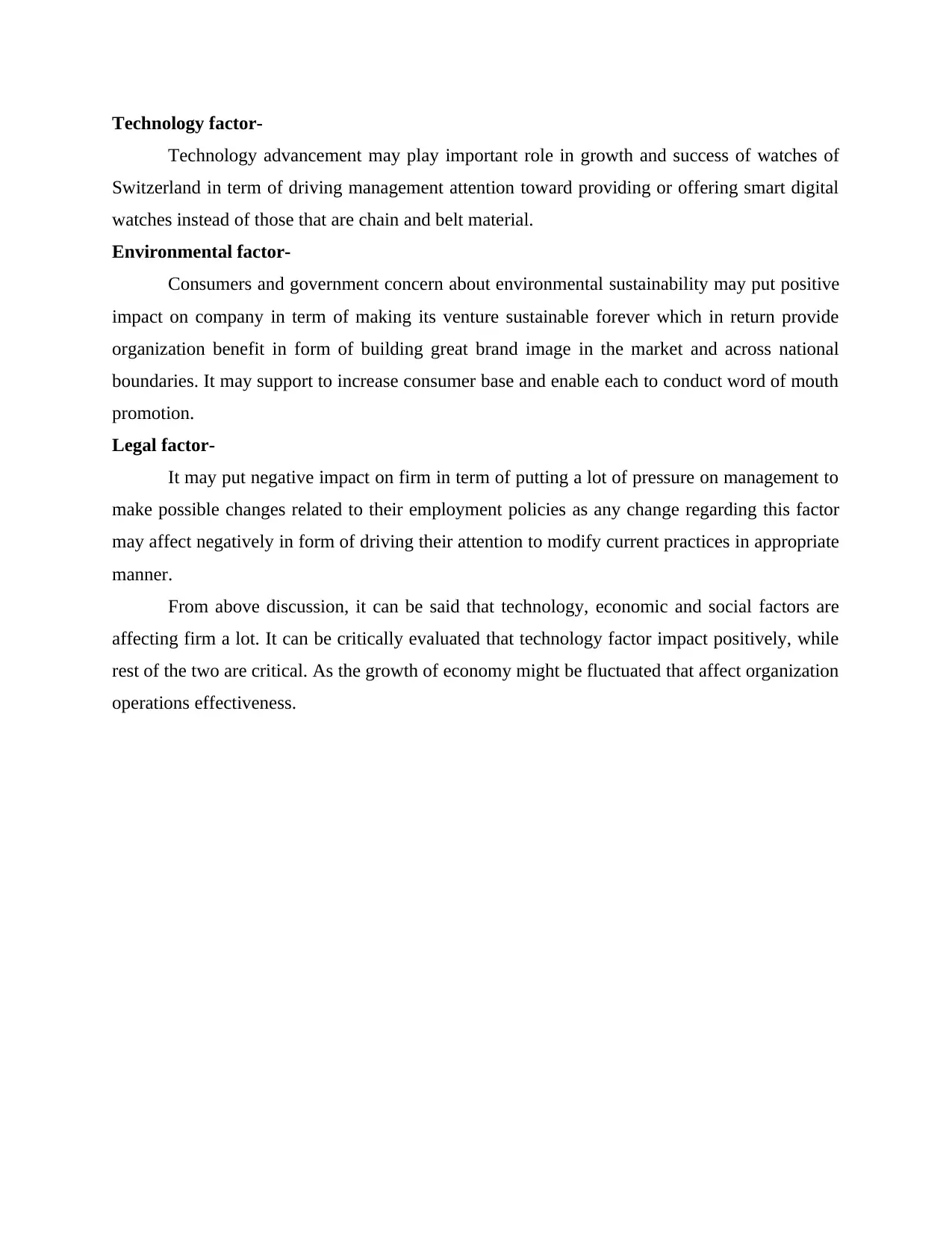
Technology factor-
Technology advancement may play important role in growth and success of watches of
Switzerland in term of driving management attention toward providing or offering smart digital
watches instead of those that are chain and belt material.
Environmental factor-
Consumers and government concern about environmental sustainability may put positive
impact on company in term of making its venture sustainable forever which in return provide
organization benefit in form of building great brand image in the market and across national
boundaries. It may support to increase consumer base and enable each to conduct word of mouth
promotion.
Legal factor-
It may put negative impact on firm in term of putting a lot of pressure on management to
make possible changes related to their employment policies as any change regarding this factor
may affect negatively in form of driving their attention to modify current practices in appropriate
manner.
From above discussion, it can be said that technology, economic and social factors are
affecting firm a lot. It can be critically evaluated that technology factor impact positively, while
rest of the two are critical. As the growth of economy might be fluctuated that affect organization
operations effectiveness.
Technology advancement may play important role in growth and success of watches of
Switzerland in term of driving management attention toward providing or offering smart digital
watches instead of those that are chain and belt material.
Environmental factor-
Consumers and government concern about environmental sustainability may put positive
impact on company in term of making its venture sustainable forever which in return provide
organization benefit in form of building great brand image in the market and across national
boundaries. It may support to increase consumer base and enable each to conduct word of mouth
promotion.
Legal factor-
It may put negative impact on firm in term of putting a lot of pressure on management to
make possible changes related to their employment policies as any change regarding this factor
may affect negatively in form of driving their attention to modify current practices in appropriate
manner.
From above discussion, it can be said that technology, economic and social factors are
affecting firm a lot. It can be critically evaluated that technology factor impact positively, while
rest of the two are critical. As the growth of economy might be fluctuated that affect organization
operations effectiveness.
Paraphrase This Document
Need a fresh take? Get an instant paraphrase of this document with our AI Paraphraser
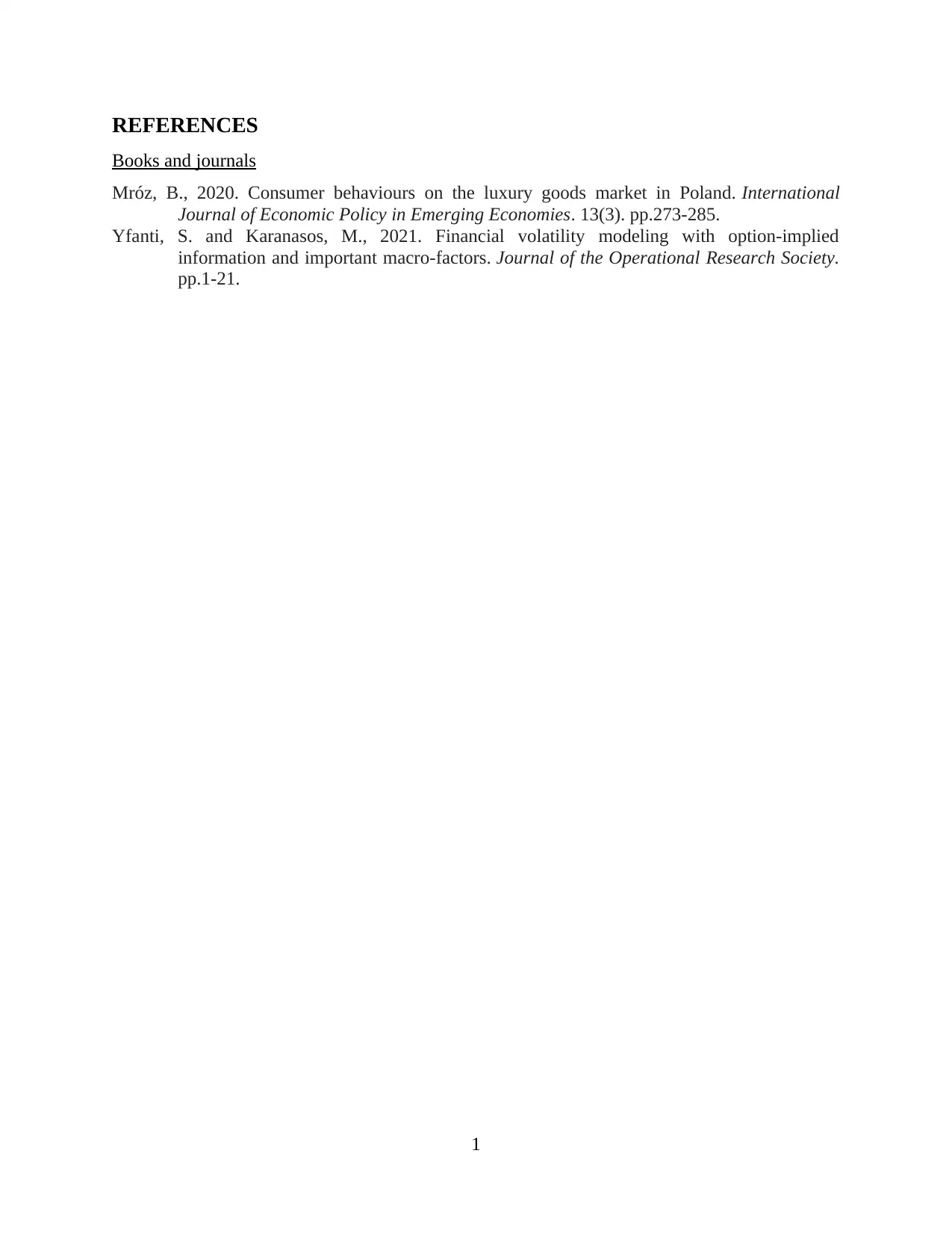
REFERENCES
Books and journals
Mróz, B., 2020. Consumer behaviours on the luxury goods market in Poland. International
Journal of Economic Policy in Emerging Economies. 13(3). pp.273-285.
Yfanti, S. and Karanasos, M., 2021. Financial volatility modeling with option-implied
information and important macro-factors. Journal of the Operational Research Society.
pp.1-21.
1
Books and journals
Mróz, B., 2020. Consumer behaviours on the luxury goods market in Poland. International
Journal of Economic Policy in Emerging Economies. 13(3). pp.273-285.
Yfanti, S. and Karanasos, M., 2021. Financial volatility modeling with option-implied
information and important macro-factors. Journal of the Operational Research Society.
pp.1-21.
1
1 out of 5
Related Documents
Your All-in-One AI-Powered Toolkit for Academic Success.
+13062052269
info@desklib.com
Available 24*7 on WhatsApp / Email
![[object Object]](/_next/static/media/star-bottom.7253800d.svg)
Unlock your academic potential
Copyright © 2020–2026 A2Z Services. All Rights Reserved. Developed and managed by ZUCOL.



